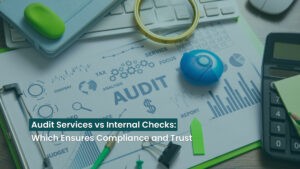Most business owners view audits as something to “survive”, akin to a taxman knocking at your door or paperwork chaos. But what if we told you that audits aren’t just a financial requirement? They’re one of the most powerful tools to improve your business habits.
Yes, you read that right.
Done right, audits can transform the way your business operates, making you more organized, more efficient, and more profitable.
Let’s explore how.
Audits Are Not Just About Numbers, They’re About Behavior
An audit isn’t just a financial report card. It’s a mirror that shows you your business habits, the good, the bad, and the sloppy.
When you review your records, systems, spending, team performance, or compliance, you’re examining how your business behaves.
- Do you forget to follow up with vendors?
- Are invoices delayed?
- Are employees unclear about processes?
- Is money being spent carelessly?
Audits help you catch these patterns. They bring your business habits under the spotlight, and that’s when real change starts.
Why Business Habits Matter More Than Big Plans
Anyone can create a beautiful strategy on PowerPoint.
But in real business, it’s your habits that determine success:
- Do you review your cash flow weekly?
- Do you track project delays?
- Do you set goals and follow through?
Without strong business habits, even the best business plan falls flat.
That’s why regular audits, internal or external, play a critical role. They enforce discipline, reveal blind spots, and give you the data you need to make better decisions.
Business Audit Benefits That Change the Game
Audits are not just checkboxes for compliance. Here are some real-life business audit benefits that small and medium enterprises (SMEs) in Pakistan (and anywhere) can enjoy:
1. Clarity on Cash Flow
You may think you’re profitable, until an audit shows you’re constantly short on cash because of poor billing habits.
This is one of the top business audit benefits: seeing your actual financial health, not just a rough guess.
2. Better Internal Controls
Are two employees handling the same task? Is no one double-checking inventory orders? Are sales teams giving unauthorized discounts?
Audits improve business efficiency by pointing out loopholes in your systems.
3. Increased Investor Trust
Whether you’re pitching to angel investors or banks, showing them clean, audited records builds credibility.
It says: “We know our business. We manage our habits.”
How Audits Improve Business Efficiency?
We often assume “efficiency” comes from software or automation. But in reality, it comes from habit change.
Let’s break it down.
Before Audit:
- You forgot to reconcile bank accounts for 3 months.
- Employees submit petty cash receipts late.
- Procurement happens without proper budgeting.
After Audit:
- You now reconcile every Friday morning
- You’ve set up a petty cash approval policy.
- Purchasing is aligned with actual cash flow.
This is audit-driven business growth, the kind that comes not from huge investments, but from better behavior across the team.
How Audits Optimize Operations (Even Without Fancy Tools)
You don’t need expensive ERP software or consultants to get started.
Small businesses can run internal audits every quarter using fundamental checklists:
- Are all invoices being issued on time?
- Are we collecting payments within 30 days?
- Are tax returns being filed before the deadline?
- Are team KPIs being reviewed and updated?
These questions can be turned into a simple Excel sheet, a DIY audit that improves your business habits with every cycle.
This is one of the most overlooked audit tips for small business owners: You don’t need to wait for external audits. You can start with internal check-ups.
The Pakistani Context: Audit Rules and Regulations
In Pakistan, audits aren’t just good practice; they’re required by law under certain conditions.
Let’s go over the audit regulations according to SECP and FBR:
1. SECP Audit Requirement
All companies registered under the Companies Act, 2017 (private or public) must appoint an auditor.
Private Limited Companies with capital above PKR 1 million must get audited financials yearly.
Auditors must be practising registered Chartered Accountants (CA) registered with ICAP.
2. FBR and Tax Audits
Annual tax returns are subject to audit selection by FBR, especially if discrepancies or high-risk sectors are involved.
Businesses are expected to maintain 6 years of financial records under the Income Tax Ordinance, 2001.
Non-filers or late filers may face random audits or demand notices.
Having organized financial habits and a history of clean audits reduces your audit risk and also builds confidence with tax authorities.
Audit-Driven Business Growth: A Mindset Shift
Many businesses view audits as an external “event.” But the real growth comes when you treat audits as an internal culture.
Here’s what happens when you build an audit-ready mindset:
- Teams get used to documenting things properly
- Everyone starts tracking performance
- You stop “guessing” and start analyzing
- Decisions are made based on real numbers
- Leaders feel more in control
This isn’t about being perfect. It’s about consistent business habits that drive results.
After missing their second tax deadline, they were selected for an audit by the FBR.
Panicked, they brought in a small audit team that not only helped them prepare but also reorganized their entire financial system.
- They started tracking every expense with receipts.
- Reconciliations happened every Friday.
- Monthly management reports were introduced.
- Employee KPIs were aligned with financial goals.
Within 6 months, their burn rate dropped, revenue stabilized, and they secured seed funding.
Sara now calls audits their “wake-up call”, the turning point that built long-term audit-driven business growth.
Audit Tips for Small Business Owners: Simple But Effective
If you’re a small business owner, audits can feel overwhelming. But here are easy tips that make a big difference:
1. Don’t Wait for Year-End
Start internal reviews quarterly. This spreads the workload and improves consistency.
2. Involve the Team
Audits aren’t just a finance job. Everyone in HR, sales, and operations plays a role in maintaining clean records.
3. Set Habits, Not Just Deadlines
Make audit-prep a monthly routine, not a yearly panic.
4. Use Technology
Free tools like Wave, Zoho Books, or even Excel templates can help track expenses and invoices.
These audit tips help you develop strong business habits without burning out or overspending.
Audits Create Accountability, And That’s a Good Thing
Many entrepreneurs resist audits because they fear being “caught.”
But a shift in mindset changes everything.
Audits are not about punishment, they’re about progress.
They:
- Catch blind spots
- Set accountability structures
- Build professional credibility
- Make future planning easier.
With every audit, your team becomes sharper. Your business becomes stronger. And your business habits become part of your success story.
Audit Yourself Before The World Does
Here’s the hard truth: If you don’t audit yourself, someone else will, whether it’s an investor, a tax authority, or a client doing due diligence.
Why wait for that?
Build a culture where audits are seen as growth tools, not threats.
Let audits:
- Refine your operations
- Improve your team’s discipline.
- Catch financial leakage
- Enhance your business confidence.
Strong business habits don’t just happen. They are built, audit by audit.
Audits Help You Build, One Step at a Time
Let’s break down the actual business habits you build when audits become a part of your rhythm. These aren’t just accounting habits; they’re operational, cultural, and leadership-driven changes that elevate your entire organization.
1. You Learn to Document Everything
Audits force you to get organized. And that’s not a bad thing.
You start keeping contracts in one place, recording expenses correctly, and tracking payments instead of relying on memory or WhatsApp messages. It becomes second nature to document before you decide.
That single habit alone saves you from internal conflicts, tax issues, and even legal trouble.
2. You Check in With the Numbers More Frequently
Businesses that audit regularly become more financially aware.
You stop making decisions just on “gut feel” and start asking:
- “What do the numbers say?”
- “Can we afford this?”
- “Are we spending more than expected in this department?”
Even a simple monthly habit of reviewing your profit/loss report can dramatically increase accountability and reduce impulsive spending.
This is why audits improve business efficiency, not because they change your systems, but because they improve the discipline of using those systems.
3. You Create a Culture of Accountability
Once teams know that audits are part of the culture, they step up their game.
They:
- File reports on time
- Follow approval flows
- Communicate decisions with more clarity.
That’s the real audit-driven business growth, not just growing revenue, but growing a stronger business culture.
Why Audits Matter More in Pakistan’s Business Climate?
In countries like Pakistan, where informal business practices are still standard, building formal habits through audits is even more critical.
Here’s why:
- Many small businesses don’t track petty cash or customer dues, and audits help plug revenue leaks.
- Frequent regulatory changes (tax laws, import duties, withholding rules) can easily be missed, but audit alerts catch them early.
- Investors are more cautious and require clarity, and clean audit records boost credibility.
- With rising digital taxation and FBR scrutiny, being audit-ready saves you from surprise penalties or account freezes.
In Pakistan, your survival and scale depend on how well you build audit-based habits.
A Quick Business Audit Self-Check
Want to get started without any tools or consultants?
Here’s a simple self-audit you can do today, in under 30 minutes:
- Do we track monthly income and expenses in one system?
- Are all contracts and legal documents stored securely?
- Do we have clear approval steps for payments?
- Do we pay taxes on time and keep receipts?
- Do team members have defined roles and KPIs?
The more checkmarks you have, the stronger your business habits are. You’re not behind; you’re just ready to grow.
How MSAFDAR Helps You Build Stronger Business Habits?
At MSAFDAR, we don’t just “run audits.” We help you build the habits that make your business unshakable.
Whether you’re a small startup or a growing mid-size firm, we offer:
- Internal audit frameworks
- SECP and FBR audit compliance
- Financial control setups
- Monthly management reviews
- Strategic audit planning
We work like your business partner, helping you see, fix, and grow.
FAQs
Q1: What’s the difference between internal and external audits?
Your team does internal audits to improve internal systems. Registered professionals conduct external audits to ensure compliance.
Q2: How do audits help small businesses specifically?
They reveal inefficiencies, improve documentation, reduce financial risks, and help meet tax and legal requirements.
Q3: Can I do my audit as a startup?
Yes! Use fundamental checklists and software to start internal audits. External audits can be hired annually.
Q4: Are audits legally required in Pakistan?
Yes, for companies registered under SECP and for tax purposes under FBR, if selected or if your business meets the criteria.
Q5: How often should I audit my business?
Ideally, do internal audits quarterly and external audits yearly. It’s not just about rules, it’s about better business habits.




